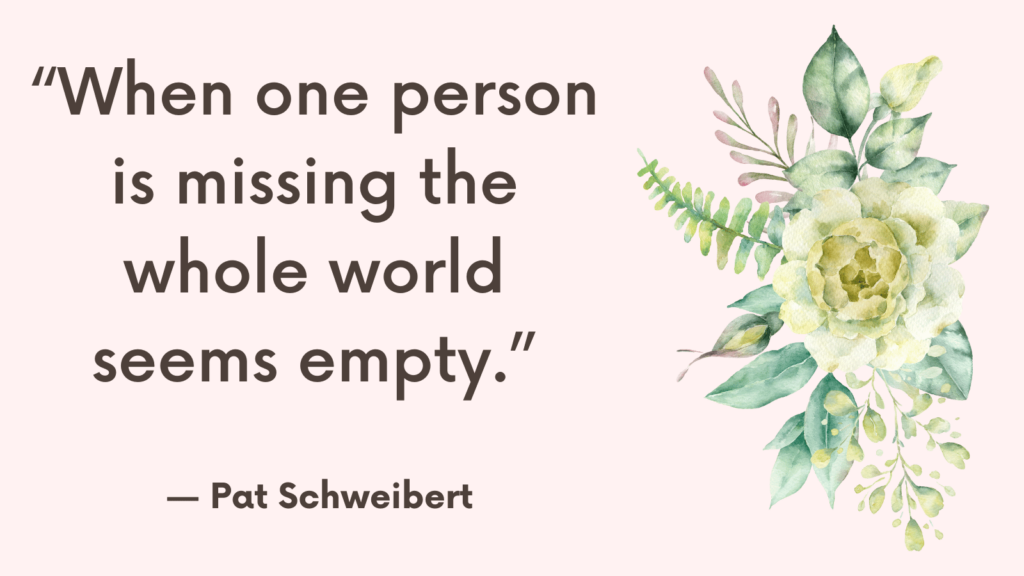This post contains a list of gifts for widows to inspire you.
Disclosure: Some of the links below are affiliate links. This means that, at zero cost to you, I will earn an affiliate commission if you click through the link and finalize a purchase.
Challenges Faced by Widows
The challenges faced by widows can vary depending on various factors such as cultural norms, social support systems, financial stability, and personal circumstances.
Some of the common challenges that widows may experience include:
1. Emotional distress: The loss of a spouse can lead to intense grief, sadness, anger, and feelings of loneliness. It is important for widows to recognize and allow themselves to grieve while seeking appropriate support from friends, family, or professional counselors.
2. Financial difficulties: The death of a spouse can often result in a significant loss of income and financial instability. Widows may face challenges in managing finances, especially if they were financially dependent on their late partner. Seeking financial guidance, exploring resources, and considering professional advice can help navigate these challenges.
3. Social isolation: The absence of a spouse can lead to feelings of isolation and disconnection from social circles. Widows may struggle with finding new sources of companionship and support. It can be helpful for widows to actively seek out support groups, counseling, or community organizations to connect with others who have experienced similar losses.
4. Adjusting to new roles and responsibilities: Widows may find themselves suddenly responsible for tasks and decisions that were previously handled by their late spouse. This adjustment can be overwhelming and challenging. Seeking help from family members, friends, or professionals can ease the burden of new responsibilities and provide guidance during this transition.
5. Stigma and societal expectations: In some cultures, widows may face societal stigmas or expectations that can exacerbate their challenges. Challenging these societal norms and seeking support from like-minded individuals or organizations that promote the rights and well-being of widows can be empowering.
Related: How Do Widows Cope With Loneliness? Top 10 Ways
Gifts For Widows
Losing a loved one can be an incredibly challenging and emotional experience.
While there is no specific list of gifts that universally applies to all widows, the following suggestions may you help support and comfort them during this difficult time:
1. A personalized keychain or engraved keepsake
A personalized keychain or engraved keepsake provides a sense of connection and comfort during the grieving process.
By personalizing it with a name, initials, or a meaningful message, it becomes a symbol of remembrance and serves as a source of support and strength.
2. A comforting blanket or throw to provide warmth and comfort
This item is designed to offer physical comfort and warmth during times of grief.
It can be a soft and cozy blanket or throw, providing a sense of security and solace when someone feels overwhelmed or in need of emotional support.
3. A journal or diary for reflection and expressing emotions
This tool allows individuals to express their thoughts, feelings, and experiences in a private and personal way.
Writing in a journal can be therapeutic, helping to process emotions, gain insight, and find moments of clarity and understanding throughout the grieving process.
4. A spa or self-care package
This package typically includes items such as soothing bath products, scented candles, lotions, and other self-care items.
Engaging in self-care activities can help promote relaxation, reduce stress, and provide moments of respite and rejuvenation during challenging times.
Related: Grief Comes In Waves: Top 12 Lessons From Grief No One Talks About
5. Inspirational Message Mug
An inspirational message mug is a gentle, practical gift that fits into daily life. It offers quiet support during morning coffee or tea without needing conversation or explanation. A simple, thoughtful message can provide strength during hard moments, making it a meaningful gift that’s useful, comforting, and not overwhelming.

6. A gift certificate for a massage or spa treatment
This gift allows the individual to take time for themselves and indulge in relaxation and self-care.
Massage therapy has been shown to reduce stress, alleviate physical tension, and promote emotional well-being, offering a much-needed respite during the grieving process.
Related: How To Help A Grieving Parent? (+FREE Worksheets For Grief)
7. A personalized photo album or framed picture of their loved one
This item provides a visual reminder of cherished memories and can be a source of comfort and solace.
Looking at photos evokes positive emotions and facilitates a sense of connection to the person who has passed away, allowing for moments of reflection and healing.
8. A thoughtful handwritten letter expressing condolences and support
A handwritten letter is a personal and heartfelt way to offer condolences and support.
Expressing empathy, sharing memories, or simply letting the grieving individual know that they are not alone can be incredibly meaningful and comforting during this difficult time.
9. A donation made in memory of their loved one to a cause they care about
Making a donation to a cause that was meaningful to the deceased loved one can provide a sense of purpose and honor their memory.
This act of giving can bring comfort and a sense of contributing to something positive in the midst of grief.
10. A guided meditation or mindfulness app to reduce stress
Mindfulness practices have been shown to reduce stress, anxiety, and depression.
A guided meditation or mindfulness app provides resources and techniques to help the individual cultivate presence, calm their mind, and navigate their grief journey with greater ease and resilience.
11. A gift voucher for a session with a grief counselor or therapist
Grief counseling or therapy can be immensely helpful in navigating the complex emotions and challenges that come with grief.
A voucher for a session with a professional allows the individual to seek support from an expert who can provide guidance, coping strategies, and a safe space to express their feelings and work through their grief.
Related: Best +30 Grief Activities For Adults (+FREE Worksheets PDF)
12. A subscription to a meal delivery service to ease the burden of cooking
Grieving individuals often experience a lack of energy and motivation for everyday tasks like cooking.
A meal delivery service can alleviate this burden by providing ready-to-eat or easy-to-prepare meals.
This gift promotes self-care and ensures that the person has access to nutritious meals without having to worry about cooking during their grieving process.
13. A cozy robe or slippers for comfort at home
Comfort and self-care are important aspects of the healing process.
A cozy robe or slippers can provide physical comfort and warmth, creating a soothing environment for the grieving individual.
This gift helps create a sense of relaxation and well-being as they navigate their emotions at home.
Related: Suicide Grief Stages – How Are They Different? (+10-Step Guide To Grieve Suicide Loss)
14. A beautiful plant or flowers to brighten their space
Plants and flowers have been shown to have a positive impact on mental health and well-being.
Bringing nature indoors through a plant or a bouquet of flowers can uplift the mood and bring a sense of tranquility to the grieving person’s space.
It acts as a reminder of the beauty and renewal that can exist even in times of sadness.
15. A memoir or book about grief and healing
Reading about others’ experiences with grief can provide validation and comfort.
Memoirs or books specifically focused on grief and healing can offer insights, coping strategies, and a sense of connection with others who have gone through similar experiences.
This gift provides an opportunity for self-reflection, understanding, and personal growth.
Related: Grieving Someone Who Is Still Alive – Ambiguous Grief
16. A membership to a local support group or grief counseling center
Joining a support group or attending grief counseling sessions can offer a safe and supportive environment for individuals experiencing grief.
A membership to a local support group or grief counseling center allows the person to connect with others who have had similar experiences, share their feelings and stories, and receive guidance from trained professionals.
This gift promotes healing through community and access to valuable resources.
17. A guided grief journal or workbook
Grief journals or workbooks provide structured prompts and exercises to help individuals process their emotions and thoughts surrounding their loss.
These guided tools offer a way to reflect, express, and make sense of the grieving process in a meaningful way.
By capturing their thoughts and feelings on paper, individuals can gain clarity, understanding, and a sense of progress in their healing journey.
Related: Resilient Grieving: Best 17 Ways To Manage Grief In The Workplace (+FREE Grief Worksheets)
18. A therapeutic coloring book or art supplies for stress relief
Engaging in creative activities like coloring or art can be therapeutic and serve as a form of self-expression.
A therapeutic coloring book or art supplies provide an outlet for releasing emotions and reducing stress.
This gift allows the grieving individual to engage in a soothing and mindful activity that promotes relaxation and emotional well-being.
19. A hobby-related gift, such as a painting set or gardening tools
Pursuing hobbies and interests can be a helpful distraction from grief and provide a sense of purpose.
A hobby-related gift, tailored to the individual’s interests, encourages them to engage in activities they enjoy.
Whether it’s painting, gardening, or any other hobby, this gift promotes self-care, personal growth, and a sense of accomplishment outside of grief.
Related: Cumulative Grief: How To Cope With Bereavement Overload?
20. A guided grief support workshop or retreat
Attending a guided grief support workshop or retreat offers a structured and supportive environment for individuals to explore their grief, learn coping strategies, and connect with others who are going through similar experiences.
These workshops or retreats often incorporate therapeutic activities, discussions, and expert guidance to facilitate healing and growth.
This gift provides an opportunity for focused introspection, learning, and finding solace in a nurturing setting dedicated to grief support.

Other Ways to Show Your Support
Supporting a grieving widow requires empathy, patience, and a willingness to listen. Here are some suggestions for providing the support she may need during this difficult time:
1. Offer your presence
Let her know you are there for her and available to listen without judgment.
Sometimes, just knowing that someone is willing to lend an ear can provide immense comfort.
2. Validate her feelings
Grief can be a complex and individual process.
Avoid trying to fix or minimize her emotions. Instead, validate her feelings by saying things like, “I can’t imagine how hard this is for you,” or “It’s okay to feel angry, sad, or confused.”
Related: How To Validate Someone’s Feelings Without Agreeing? (+Examples of Validating Statements)
3. Attend to practical needs
Offer assistance with practical tasks such as grocery shopping, cooking meals, or taking care of household chores.
Grief can make it challenging for widows to focus on day-to-day responsibilities, so your practical support can be highly valuable.
4. Provide resources
Offer information about grief support groups, counseling services, or online communities where she can connect with others who have experienced similar losses.
These resources can provide her with additional support and understanding.
5. Practice active listening
When she wants to talk, give her your undivided attention.
Avoid interrupting or offering unsolicited advice. Sometimes, all someone needs is a compassionate listener who is fully present.
Related: Best 10 Books On Validation
6. Respect her boundaries
Understand that everyone grieves differently, and the widow may need space or time alone.
Respect her boundaries and let her know you are there whenever she is ready to reach out.
7. Encourage self-care
Grief can be physically and emotionally draining.
Encourage her to prioritize self-care activities such as exercise, restful sleep, proper nutrition, and engaging in hobbies or activities she enjoys.
Supporting a grieving widow is an ongoing process. Be patient, understanding, and adaptable to her changing needs. Your presence and genuine care can make a significant difference in her healing journey.
Conclusion
Remember, it’s important to consider the individual preferences and needs of the widow when choosing a gift.
It’s also essential to provide emotional support and be present for them during this challenging time.
FAQ
1. What kind of gifts are appropriate for a widow?
Consider meaningful and thoughtful gifts that acknowledge and validate their grief while providing comfort and support. Some ideas include:
– Self-care items like relaxation kits, spa gift certificates, or journals for reflection.
– Comforting items such as cozy blankets, scented candles, or inspirational books.
– Gift cards for services such as house cleaning, meal delivery, or therapy.
– Personalized gifts that honor the memory of their spouse, like engraved jewelry or photo albums.
Related: Top 5 Tips On Transmuting Grief Into Hope
2. Is it appropriate to give practical gifts?
Yes, practical gifts can be very helpful and appreciated.
Widows may face new responsibilities or financial challenges, so thoughtful practical gifts can make a significant difference in their daily lives.
Examples include grocery store gift cards, household items, or assistance with specific tasks like gardening or home repairs.
3. Should I ask the widow what she needs or wants?
Asking the widow directly about her needs or preferences is generally a considerate approach.
It shows that you respect her individuality and want to provide something meaningful.
However, it’s important to be sensitive and understanding if she doesn’t feel comfortable discussing or specifying her preferences.
Related: Grief Resources (FREE Worksheets, APPS, Podcasts, TED Talks, Books)
4. Are there any gifts to avoid?
Avoid gifts that may unintentionally remind the widow of their loss or cause additional emotional distress.
Examples may include romantic items, couple-oriented experiences, or anything that assumes a specific timeline for recovery.



